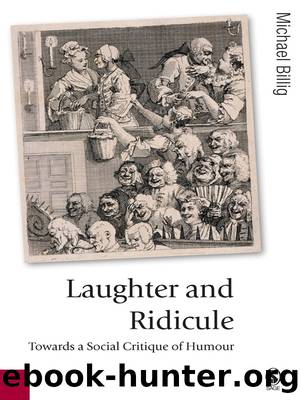Laughter and Ridicule by Billig Michael;

Author:Billig, Michael;
Language: eng
Format: epub
ISBN: 334443
Publisher: SAGE Publications
Published: 2005-07-29T16:00:00+00:00
Pleasure and unconscious intent
Bergson’s decision not to approach the topic of laughter through an analysis of experience fits well with his stress upon social function. The social significance of laughter is not to be found within the conscious experience of the person who is laughing. Someone observing a comic faux pas does not consciously think ‘That person over there is behaving with untoward rigidity, so I had better chuckle to deter any repetition.’ The laughter is spontaneously emitted without its function being represented in conscious awareness. This gap between function and experience is common within functional social analysis. Most functional explanations in sociology do not rest upon the assumption of conscious intent. The reasons that people give for their actions may not be the same as functional properties that the social analyst ascribes to those actions. As such, functions operate behind the back of the social actors. Bergson’s analysis of the social functions of laughter, in part, bears the traces of such social functionalism. But in a crucial respect he goes further, to suggest that unconscious motives may also be operating.
The issue of pleasure must be central to an understanding of laughter. Why should there be pleasure in viewing what is to be disciplined? Bergson claimed that the ‘pleasure caused by laughter … is not an unadulterated pleasure’ for ‘it always implies a secret or unconscious intent’ (1911a: 135–6). The unconscious intent refers to the disciplinary aspect: ‘In laughter we always find an unavowed intention to humiliate, and consequently to correct our neighbour, if not in his will, at least in his deed’ (ibid.: 136). The notion of ‘a secret or unconscious intent’ is interesting. Actually, the phrase does not appear in the original French text, where Bergson says that laughter is always mixed with ‘une arrière pensée’ (an ultimate aim) that society has for us and that we may not have ourselves (1900: 139).
One might ask how une arrière pensée came to be rendered in the English translation as ‘a secret or unconscious intent’. Given the care with which Bergson supervised the English translations of his works, a simple error is highly improbable. The translators of Laughter specifically declared that their translation ‘has been revised in detail by the author himself’ (‘Translators’ preface’, 1911a: v). Between the original publication in 1900 and 1911, when the translation appeared, the intellectual landscape had changed. Not only had Bergson’s name become well known but so also had Freud’s. By 1911 the phrase ‘a secret and unconscious intent’ would carry a Freudian resonance lacking in une arrière pensée. It would convey that a motive had been repressed, or censored, from conscious awareness.
Bergson, an early reader of Freud’s work, would have been well aware of the resonance. Elsewhere he indicated that his approach could be combined with that of Freud (i.e., 1920: 107). The Freudian idea of secret intentions implies much more than that social actors may not be aware of the effects of their actions on society. It implies a hidden secret. In the case of laughter, Bergson implies what this secret might be.
Download
This site does not store any files on its server. We only index and link to content provided by other sites. Please contact the content providers to delete copyright contents if any and email us, we'll remove relevant links or contents immediately.
Should I Stay or Should I Go? by Ramani Durvasula(7443)
Why We Sleep: Unlocking the Power of Sleep and Dreams by Matthew Walker(6391)
Fear by Osho(4516)
Flow by Mihaly Csikszentmihalyi(4507)
Rising Strong by Brene Brown(4211)
Why We Sleep by Matthew Walker(4206)
How to Change Your Mind by Michael Pollan(4133)
Too Much and Not the Mood by Durga Chew-Bose(4111)
The Hacking of the American Mind by Robert H. Lustig(4111)
Lost Connections by Johann Hari(3943)
He's Just Not That Into You by Greg Behrendt & Liz Tuccillo(3727)
Evolve Your Brain by Joe Dispenza(3517)
The Courage to Be Disliked by Ichiro Kishimi & Fumitake Koga(3272)
Crazy Is My Superpower by A.J. Mendez Brooks(3213)
Resisting Happiness by Matthew Kelly(3207)
What If This Were Enough? by Heather Havrilesky(3206)
Descartes' Error by Antonio Damasio(3171)
The Book of Human Emotions by Tiffany Watt Smith(3155)
In Cold Blood by Truman Capote(3151)
